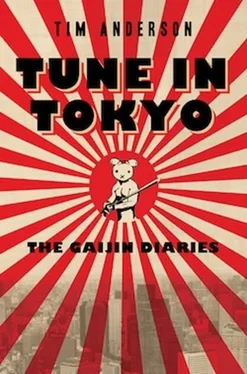“Look, Jimmy! Isn’t it beautiful?” I ask Jimmy as we stare wide-eyed at one of Japan’s most marvelous sights, the majestic Mount Fuji, which on a clear day is visible from Tokyo.
He doesn’t answer. He looks impressed and awestruck, but more than a little scared, like a child sitting up in bed, eyeing his bedroom closet door, fearful of the hideous monster that lurks behind it. But why? Why does Jimmy look so pale, so panic-stricken, so pop-eyed? Is it the experience of looking at something so beautifully formed by nature and nature alone? Is it due to the vertigo one gets sometimes when seeing in person a sight normally only seen in pictures and postcards? Or is it because he’s currently at the Fuji-kyu Highlands amusement park just outside of Tokyo, strapped in beside me in one of the world’s fastest and tallest roller coasters, the Fujiyama (“Mount Fuji”), from which Mount Fuji is clearly visible, and which is currently at the beginning of its great initial ascent of eighty meters? We’ll probably never know.
We clamber up towards the summit, and when we reach it, the coaster momentarily straightens out, allowing us a brief respite from abject terror before nose-diving back to the ground at warp speed. Jimmy’s gleeful screams fill my ears as my cheeks flap in the wind and spittle splashes upon my chin and neck. We drop and drop and drop. Then we twist, turn, twist, ascend, nose-dive again, and finally, finally the carriage slows down and pulls back into the boarding area. The ride is over. With exhilaration, we realize we’ve survived, that everything will be OK, that we’ll live to eat another Japanese pancake. Though just a few moments ago we were tasting our own mortality in the back of our throats and were very close to puking it up, we managed to keep it down and make it through to the finish line. This calls for some green tea ice cream.
“How about it, Jimmy?” I ask.
“Yeah, but while we’re here, we might as well visit the haunted insane asylum. Get that out of the way.”
You know how, in the first blush of romance, you spend so much time with someone because you don’t want to be out of each other’s sight and it’s all great for the first few days because you’re all excited and you start mapping out your future together in your head and then the magic wears off a little bit and a few days later you kind of get sick of the sight of them especially after you catch them using your toothbrush-your toothbrush!-and you start to wonder when oh when they are ever just going to go away and sleep in their own freaking bed? I didn’t want that to happen between Jimmy and Tokyo. So after spending a few days locked in a passionate three-way with this fair city, we decide to take a trip south. It’s preemptive day trip time.
So it’s off to Kamakura to show Jimmy my friend the Big Buddha and then to the small rocky island of Enoshima, just off the coast of Fujisawa city, my old stomping ground. We walk across the bridge from Kamakura and onto the island on a beautiful sunny afternoon. We hike up the narrow, winding paths of the island village, visit small neighborhood temples, and sip green tea at little old-fashioned tearooms where the staff are simultaneously fascinated and horrified by us and our big, ungainly American ways. We follow the paved paths as they cut through thick greenery and eventually find ourselves heading down toward a rock outcropping on the side of the island where the land meets the water. I follow Jimmy down, and we alight on the flat rocks, pushed along by the determined Enoshima wind whispering in our ears, “Hurry up, gaywads, it’s beautiful down there!”
We walk to the edge of the rocks and stare down as the water from Sagami Bay licks at the hard edges of the island, and we wordlessly sit for a rest after our long walk. The cold water laps against the flat rocks and into the deep gaps between them. The sun and wind work in perfect concert, ensuring we are neither too hot nor too chilly as we lie back on the rocks and allow the surroundings to lull us into a brief catnap.
I open my eyes a half hour later and feel a bit of a chill. The sun has fallen behind the clouds, though its rays still pierce them in a few narrow, jagged lines. I look over and Jimmy is lying very close to the edge, dipping his hand in the cold water. I realize that we haven’t really talked much about our relationship since he’s been here, and I get the feeling we’re about to. We’ve managed to avoid the topic for a few days, busy as we’ve been with entertaining ourselves. Now that we’re away from Tokyo and in a place where we can actually hear each other, the time seems right. He needs to know when I’m coming home. And I need to decide.
The setting sure lends itself to a good, deep conversation about where our lives are going. “Jimmy, our love is like this water,” I might say, waxing poetic on our future. “It’s deep, it’s cleansing, it’s salty. And it covers three-quarters of the earth. Yes, Jimmy, our love covers three-quarters of the earth. It leaves Sagami Bay and flows out into the Pacific into all sorts of amazing places like Australia and Poland.”
“Our love flows to Poland via the Pacific Ocean?” Jimmy might wonder.
“It’s just a metaphor, but, you know, our love is deep and blue and has the power to sink many ships.”
At this point Jimmy might sigh and say, “Spare me the double-talk. I need dates. When are you coming home?”
“But…what will Tokyo say?” I wonder. “She loves me. Or at least tolerates me.” (OK, she finds me quite irritating.)
I go over and sit down next to Jimmy on the edge of the rocks.
“This is the most amazing place I’ve ever been,” he says.
“Wow. And you’ve been to Kraków.”
“I feel like I’m in one of those Kuniyoshi paintings.”
“Me too. Who is he?”
“A painter.”
“Oh, yeah.”
“You’re coming home, right?” he asks. “Soon, right?”
“Yes.”
“I need to know when.”
I struggle to figure out what to say.
“I really need to know when.”
“OK. How about five months? Can you wait five more months?”
He sighs, dips his hand in the cold water, and flicks droplets with his wet fingers.
“Yeah, OK. I can do that. But I want a kimono. And not one of those cheap ones we were looking at at the Grand Asia Plaza. I want one that feels like flower petals against my skin. Got that? Flower petals.”
I do some quick calculations in my head and try to remember the name of that cheap, secondhand kimono shop in Kichijyoji a student once told me about.
“OK.”
“OK.”
“What if I found one that-”
“Flower. Petals.”
“OK.”
Our Tokkaido Line train glides back into Tokyo’s Shinagawa Station, and I snap Jimmy out of the daze he fell into thirty minutes ago as he watched an old man across from us reading a big fat manga comic and picking his nose. We change to the Yamanote train, then to the Chuo Line, and finally reach Koenji. We slump back to my tiny room and collapse onto the bed.
I awake slowly the next morning, wondering groggily what we should do on Jimmy’s last day. I know he’s had a great time, I know Tokyo has shown him her best, but his visit is still lacking that transcendental moment when the world explodes into a widescreen Technicolor and people start dancing around you Busby Berkeley-style. Hmmm. What could we do? Where could we go? Who could we see?
“Oh my God! Fucking Itoya!” Jimmy cries, popping awake and jumping out of bed.
“Who?”
“Itoya! Itoya! ”
I stare at him with big dumb eyes.
“The goddamn washi paper store! We’ve got to go there!”
Itoya, of course. Everyone who knows anything about washi knows Itoya. What? You don’t know what washi is?
Читать дальше












